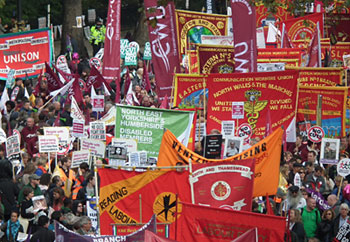

Vol. 76/No. 40 November 5, 2012

|
| Militant/Jonathan Silberman |
| Persistent unemployment, boss attacks fuel large turnout for Oct. 20 march in London. |
The demonstration provided an outlet for tens of thousands to express their anger at the attacks of the bosses and the Conservative government and push for measures to alleviate the blows to jobs, hours and safety.
“Why should I pay for this recession?” asked Bill Smith, a postal worker from the northwest marching with the Communication Workers Union contingent. He told the Militant how Royal Mail is taking advantage of the high level of unemployment. “There is more bullying and harassment at work and there are not other jobs to go to. It’s like living in Stalin’s Russia,” he said. “They used to take part-time workers onto full-time contracts but they don’t do that anymore.”
In addition to the march in London, tens of thousands rallied in similar protests in Belfast, Ireland; and Glasgow, Scotland.
Joining a number of union officials, one of the featured speakers at the rally was Ed Miliband, leader of the opposition Labour Party.
Miliband got a good response when he attacked the government’s drive to cut public services and jobs. But he met boos when he said he had to “level with people” and under his party there would have to be cutbacks.
“Of course there will still be hard choices,” Miliband told the crowd. “I have said whoever was in government now there would still need to be some cuts. But this government has shown us cutting too far and too fast, self-defeating austerity is not the answer.”
“We would make different but fairer choices including on pay and jobs,” he said.
The United Kingdom is mired in economic contraction and the working class has been hit hard. Unemployment has stood at more than 2 million since the beginning of 2009. In August, official unemployment was 2.53 million. Half of all new jobs created recently provide less than 30 hours work a week. Long-term unemployment, those out of work for more than a year, increased in June to 887,000.
Living standards have fallen over the last four years by 13 percent. The impact of continuing high unemployment and ongoing attacks by the bosses drew comments from workers on the march who spoke with the Militant.
Jane Rogers, a retired shop worker from Blackpool, marched with the Union of Shop, Distributive and Allied Workers. She described how the “government is extending Sunday trading laws and retailers use this to cut shop workers’ wages by slashing overtime rates. The government should be creating jobs, not cutting them.”
Earlier this year the government pledged to cut 730,000 public sector jobs by 2016.
“I’m angry about the cuts to nursing staff, the NHS [National Health Service] is kowtowing to the businesses,” Caroline Hawkins, a nurse from the Midlands and member of UNISON, the main public workers union, said. “They are trying to reduce our sick pay, as well as the allowance I get for driving thousands of miles to visit patients every month.”
Thomas Galliford, a history student at University of Hertfordshire, came with his family to the protest. “I’m marching because my friends can’t get jobs, my girlfriend’s tuition fees have risen and my parents are having to work longer hours,” he said.
Unemployment for 16 to 24 year olds stands at 20.5 percent, nearly three times the rate for the population as a whole.
Fred Gibson, a bus driver for the Arriva company in High Wickham and a member of UNITE, said he was “demonstrating for justice because working people are not being treated like the upper classes. I often work 12-hour shifts, but get paid for 10, with a two hour unpaid break. Arriva is now contracting out the work of cleaners and the new cleaning bosses will be looking to take advantage of that to weaken the union.”
“The job cuts haven’t started to bite yet, but they will. There are few jobs already in the former mining villages in the northeast,” said Alan Johnson, a retired miner from Dawdon colliery, Durham, a member of the National Union of Mineworkers and veteran of the 1972, ’74 and ’85 miners’ strikes.
“Right now they’re crucifying people on incapacity benefits,” Johnson said, describing those on disability. “Whether they’re in the union or not we’re fighting for all retired miners. Over 50 percent of appeals by workers against rulings to eliminate their incapacity benefit are won.”
Some workers passing by the march expressed support for the government’s attacks. “Labour got us into this mess and the Conservatives will look after us more because they will spend less,” Marion Harris, a retired nurse from Cwmbran in South Wales, said.
Related articles:
S. Africa: 100,000 miners refuse to end their strike
On the Picket Line
Front page (for this issue) |
Home |
Text-version home